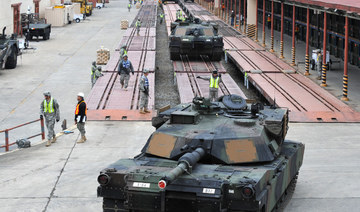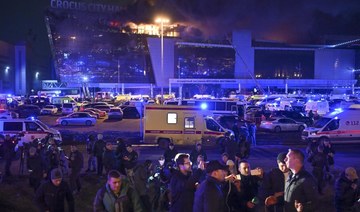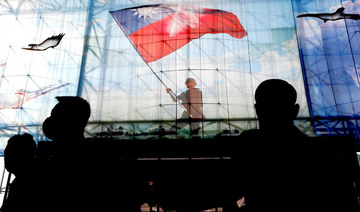MANILA: Philippine President Rodrigo Duterte thinks political dynasties are bad. But the way the prevailing political winds are blowing, it looks like a dynasty of his own might be taking shape.
Nine months away from mid-term elections that could determine the success or failure of his presidency, his daughter, Sara Duterte, is fast emerging as a power-broker who is aiming to shore up support for his ambitious policy agenda, and, say some experts and insiders, his eventual succession.
By his own admission, the 73-year-old president is flagging. On Tuesday, he lamented his uphill struggle to tackle illicit drugs and cut state corruption, predicting that he’ll “hardly make a dent” in his remaining four years in office.
During a ceremony and again at a dinner afterwards, he said he was tired, exasperated and thinking about quitting, and ended his somber, one hour, 20 minute speech with: “I’m telling you, I’m ready to step down and retire.”
That contrasts sharply from his 40-year-old daughter, who has started maneuvering to build alliances and expand her small party in the southern Davao region into a new political juggernaut, as fissures appear in her father’s ruling PDP-Laban party.
She was instrumental in bringing together political factions to stage a dramatic July 23 ousting of divisive Duterte ally Pantaleon Alvarez as lower house speaker, replacing him with veteran Gloria Macapagal Arroyo, 71, a former president with clout and connections to ensure support for Duterte and his agenda.
The move was helped by a relationship developing between Sara Duterte and Imee Marcos, 62, a provincial governor and key figure in the still influential family of late dictator Ferdinand Marcos, who ruled the Philippines for two decades before being ousted in a 1986 uprising.
The two women posed together for pictures last week, each with one hand doing Duterte’s trademark clenched fist, and making a “V” sign synonymous with the rule of Marcos with the other.
Rodrigo Duterte’s rise has been a boon for the Marcos family. Imee Marcos frequently attends his official events and in 2016, Duterte granted her longstanding wish for her father to be buried with military honors at a Manila heroes’ cemetery.
Duterte also said last week that if he steps down, her brother, Ferdinand Marcos Jr., a former senator better known as “Bongbong,” would have been a capable replacement for him.
Marcos Jr came a close second to Leni Robredo, a rival of Duterte, in the 2016 vice presidential election, but he has challenged the result in the Supreme Court.
“New center of gravity“
Richard Heydarian, an author, columnist and academic who specializes in politics, said the Marcos family wanted to stay relevant nationally and in a political culture where loyalties easily shift, Sara Duterte was now widely seen as a figure worth rallying behind.
“People around (Rodrigo) Duterte are looking for a new center of gravity. They see signs of an exhausted president and see there could be some kind of succession that can protect their interests,” he said.
“He has a very shallow network of politicians, he’s not at his peak. He just has to hold on as long as he can.”
Duterte acknowledges that, and on Tuesday said he can’t resign because a constitutional succession would mean handing power to opposition leader and vice president Robredo, who was elected separately. He said Robredo isn’t up to the job — which she refutes — and he’d prefer a junta takes over.
Duterte’s relationship with daughter Sara has however often appeared rocky and she has portrayed herself as his reluctant successor as mayor of Davao City.
Like her father, she is feared and respected, and known for being blunt, unpredictable and for openly trading barbs with the president.
Despite that, few doubt her loyalty to him. Although she denies being interested, she and other Duterte allies, including his spokesman, his special assistant and his former police chief, are tipped to run for the 24-seat Senate in 2019, as is Imee Marcos.
That could be a game-changer for the president, who has built a strong majority in the House of Representatives but needs control of the upper house to deliver on his promises.
Among a raft of plans, he wants to redraft the constitution and deliver his centerpiece economic policy, a $180 billion infrastructure spree designed to modernize the country, spur spending, create jobs and lure investment.
“Now is the chance to further consolidate power by controlling both houses of congress and the local government units so all of us can we move forward in cadence,” said a member of a nine-party alliance formed by Sara Duterte last week.
He requested anonymity, saying only Sara Duterte could speak about the alliance.
“The goal is, fill the Senate with people who can help ... We don’t want people who will only obstruct his plans.”
Opposition lawmaker Antonio Tinio said Rodrigo Duterte was essentially a local politician thrust into the presidency and needed national level allies.
“Hence, his alliance with the Marcoses and Gloria Arroyo,” he said.
Tinio is skeptical about Duterte’s talk of retirement and is among many opponents who suspect he’ll try to continue beyond his permitted single six-year term — an idea Duterte this week said was idiotic.
Plan B, Tinio said, was his daughter succeeding him.
“If efforts to extend the term of President Duterte through charter change fail, it’s very likely that the Dutertes’ Davao formula for dynastic succession will prevail,” he said.
As Philippines’ Duterte starts to flag, his daughter reaches out to a Marcos
As Philippines’ Duterte starts to flag, his daughter reaches out to a Marcos
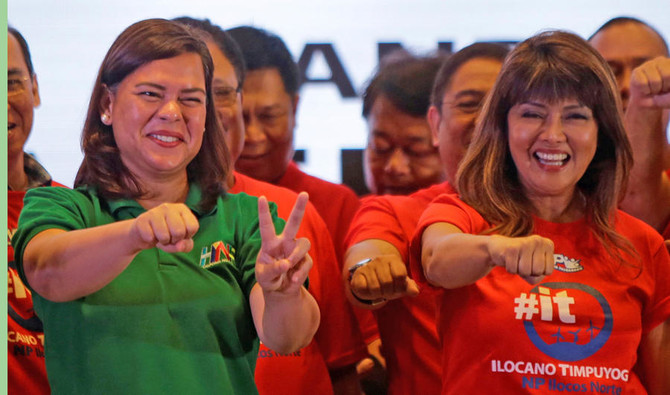
- Politicians gravitating toward younger Duterte
- President needs to deliver infrastructure, tax reforms
Anti-war protesters dig in as some schools close encampments after reports of antisemitic activity
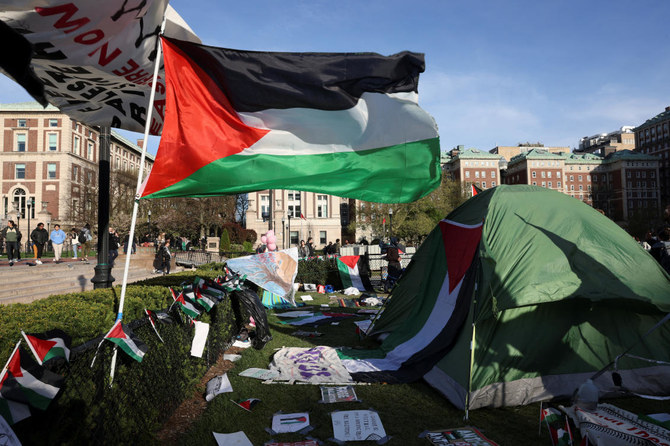
Early Saturday, police in riot gear cleared an encampment on the campus of Northeastern University in Boston while several dozen students shouted and booed at them
NEW YORK: As students protesting the Israel-Hamas war at universities across US dug in Saturday and vowed to keep their demonstrations going, some universities shut down encampments after reports of antisemitic activity among the protesters.
With the death toll mounting in the war in Gaza, protesters nationwide are demanding that schools cut financial ties to Israel and divest from companies they say are enabling the conflict. Some Jewish students say the protests have veered into antisemitism and made them afraid to set foot on campus.
Early Saturday, police in riot gear cleared an encampment on the campus of Northeastern University in Boston while several dozen students shouted and booed at them from a distance, but the scene was otherwise not confrontational.
The school said in a statement that the demonstration, which began two days ago, had become “infiltrated by professional organizers” with no affiliation to the school and protesters had used antisemitic slurs.
“We cannot tolerate this kind of hate on our campus,” the statement posted on the social media platform X said.
The University of Pennsylvania took similar action Friday when interim President J. Larry Jameson called for an encampment of protesters on the west Philadelphia campus to be disbanded, saying it violates the university’s facilities policies.
The “harassing and intimidating comments and actions” by some protesters violate the school’s open expression guidelines as well as state and federal law, Jameson said, and vandalism of a statue with antisemitic graffiti was “especially reprehensible and will be investigated as a hate crime.”
“I am deeply saddened and troubled that our many efforts to respectfully engage in discourse, support open expression, and create a community that is free of hate and inclusive for everyone have been ignored by those who choose to disrupt and intimidate,” he said.
At Columbia University, where protesters have inspired pro-Palestinian demonstrations across the country, negotiations continued with those at the student encampment.
The university’s senate passed a resolution Friday that created a task force to examine the administration’s leadership, which last week called in police in an attempt to clear the protest, resulting in scuffles and more than 100 arrests.
Though the university has repeatedly set and then pushed back deadlines for the removal of the encampment, the school sent an email to students Friday night saying that bringing back police “at this time” would be counterproductive.
Decisions to call in law enforcement, leading to hundreds of arrests nationwide, have prompted school faculty members at universities in California, Georgia and Texas to initiate or pass votes of no confidence in their leadership. They are largely symbolic rebukes, without the power to remove their presidents.
But the tensions pile pressure on school officials, who are already scrambling to resolve the protests as May graduation ceremonies near.
California State Polytechnic University, Humboldt, gave protesters who have barricaded themselves inside a building since Monday until 5 p.m. Friday to leave and “not be immediately arrested.” The deadline came and went. Only some of the protesters left, others doubled down. After protesters rebuffed police earlier in the week, the campus was closed for the rest of the semester.
In Colorado, police swept through an encampment Friday at Denver’s Auraria Campus, which hosts three universities and colleges, arresting about 40 protesters on trespassing charges.
Students representing the Columbia encampment said Friday that they reached an impasse with administrators and intend to continue their protest. After meetings Thursday and Friday, student negotiators said the university had not met their primary demand for divestment.
In the letter sent to Columbia students Friday night, the university’s leadership said “we support the conversations that are ongoing with student leaders of the encampment.”
Columbia’s president, Minouche Shafik, faced significant criticism from faculty Friday, but retained the support of trustees.
A report by the university senate’s executive committee, which represents faculty, found Shafik and her administration took “many actions and decisions that have harmed Columbia University.” Those included calling in police and allowing students to be arrested without consulting faculty, misrepresenting and suspending student protest groups and hiring private investigators.
Also Friday, Columbia student protester Khymani James walked back comments made in an online video in January that recently received new attention. James said in the video that “Zionists don’t deserve to live” and people should be grateful James wasn’t killing them.
“What I said was wrong,” James said in a statement. “Every member of our community deserves to feel safe without qualification.”
James, who served as a spokesperson for the pro-Palestinian encampment as a member of Columbia University Apartheid Divest, was banned from campus Friday, according to a Columbia spokesperson.
Protest organizers said James’ comments didn’t reflect their values. They declined to describe James’ level of involvement with the demonstration.
In France, students at the Paris Institute of Political Studies, which counts President Emmanuel Macron among its many famous alumni, students blocked access to a campus building and classes went online as the wave of protests reached overseas.
Police clashed with protesters Thursday at Indiana University, Bloomington, where 34 were arrested; Ohio State University, where about 36 were arrested; and at the University of Connecticut, where one person was arrested.
The University of Southern California canceled its May 10 graduation ceremony Thursday, a day after more than 90 protesters were arrested on campus. The university said it will still host dozens of commencement events, including all the traditional individual school ceremonies.
Universities where faculty members have initiated or passed votes of no confidence in their presidents include Cal Poly Humboldt, University of Texas at Austin and Emory University.
Russia says it struck Ukrainian energy plants in response to Kyiv targeting its own energy sector
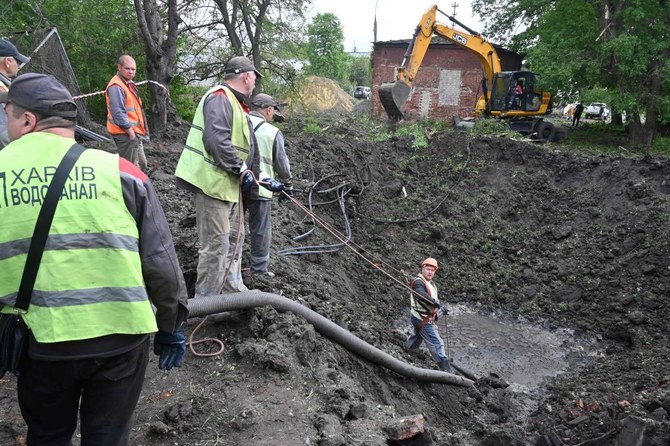
- The strikes were “in response to attempts by the Kyiv regime to damage Russian energy and industrial facilities“
- Ukraine has systematically targeted Russian oil refineries and other facilities in drone attacks in recent weeks
MOSCOW: The Russian Defense Ministry said on Saturday that its forces had carried out 35 strikes in the last week against Ukrainian energy facilities, defense factories, railway infrastructure, air defenses, and ammunition stocks.
It said in a statement that the strikes, which spanned April 20-27, were “in response to attempts by the Kyiv regime to damage Russian energy and industrial facilities.”
Ukraine has systematically targeted Russian oil refineries and other facilities in drone attacks in recent weeks, ignoring US requests not to do so.
Ukrainian officials said Russian missiles had pounded power facilities in central and western Ukraine on Saturday, increasing pressure on the ailing energy system as the country faces a shortage of air defenses despite a breakthrough in US military aid.
The Russian Defense Ministry said its campaign of strikes had been conducted using sea- and air-launched long-range precision weapons, including Kinzhal hypersonic missiles and drones.
It said it had also targeted and hit Ukrainian troop formations as well as what it described as foreign mercenaries.
Philippine capital’s financial center to become halal hub
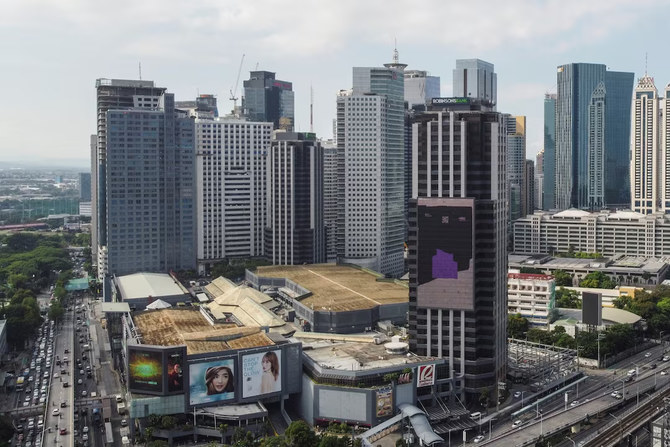
- Makati Halal Hub to act as a platform for manufacturers, traders and consumers
- Philippines’ central business district is perceived as trendsetter for other regions
MANILA: Philippine businesses in Makati City are joining hands with the Department of Trade and Industry to make the country’s financial center a halal hub, the head of the Philippine Chamber of Commerce and Industry’s Makati branch said on Saturday.
Makati City in Metro Manila is often referred to as the Philippines’ central business district. It has the highest concentration of banks and multinational and local corporations in the country. Foreign embassies are also based there.
The predominantly Catholic Philippines — where Muslims constitute about 10 percent of the nearly 120 million population — plans to raise 230 billion pesos ($4 billion) in investments and generate around 120,000 jobs by expanding its domestic halal industry by 2028.
The DTI signed on Friday a memorandum of understanding with PCCI Makati to join the government’s efforts to tap into the global halal market, which is estimated to be worth more than $7 trillion.
“To be able to implement its policies more effectively — such as the promotion and development of the country’s halal industry — they (the government) have to collaborate or strike a partnership with the business community or the businessmen who will be responsible in making this a reality,” PCCI Makati President Toots Cortez told Arab News.
“We can be the catalyst. We will begin by creating awareness, especially among the MSMEs (micro, small and midsize enterprises) because, according to the records of DTI, 99.5 percent of business in the Philippines are composed of SMEs.”
The agreement on establishing the Makati Halal Hub will position the city as a “central point for innovation and business in the halal sector, spanning a variety of industries including food production, financial services, and more,” the DTI said in a statement, as it expects the initiative to “provide substantial opportunities for Filipino entrepreneurs and international investors alike, fostering a robust economic ecosystem.”
According to the vision, the hub will act as a platform facilitating connections between manufacturers, traders, buyers, distributors and consumers in the halal sector.
“If we can group together and promote halal, I think that will be the best approach … You don’t need a big budget,” Cortez said.
“There are many Muslim embassies in Makati City, many restaurants and major establishments … Many tourists come to Makati, so if we can convince the establishments in Makati to be accredited as halal, that’s a good beginning from our side as a catalyst.”
He believes that the industry’s promotion in the city will make an impact as Makati is widely perceived as a trendsetter for other Philippine regions.
“The others, they follow the lead,” Cortez said. “They follow the lead on what’s happening in Makati City.”
US food regulator gathering information on Indian spices after alleged contamination
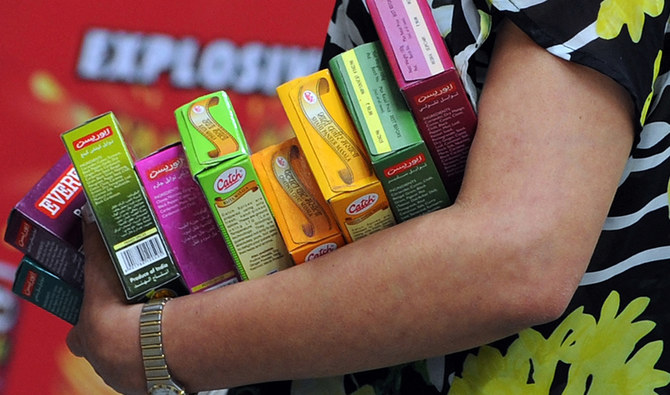
- MDH and Everest spices are among the most popular in India and are also sold in Europe, Asia and North America
- Hong Kong this month suspended sales of four MDH and Everest blends, while Singapore recalled Everest spice mix
HYDERABAD: The US Food and Drug Administration (FDA) is gathering information on products of Indian spice makers MDH and Everest after Hong Kong halted sales of some of their products for allegedly containing high levels of a cancer-causing pesticide.
“The FDA is aware of the reports and is gathering additional information about the situation,” an FDA spokesperson told Reuters on Friday.
Hong Kong this month suspended sales of three MDH spice blends and an Everest spice mix for fish curries. Singapore ordered a recall of the Everest spice mix as well, saying it contains high levels of ethylene oxide, which is unfit for human consumption and a cancer risk with long exposure.
Reuters is the first to report the US FDA’s review of alleged contamination of Indian spice products.
MDH and Everest did not immediately respond to Reuters requests for comment on this matter.
Everest has previously said its spices are safe for consumption. MDH has not responded to queries about its products so far.
MDH and Everest spices are among the most popular in India and are also sold in Europe, Asia and North America. India’s food regulator, the Food Safety and Standards Authority of India (FSSAI), is now checking the quality standards of the two companies, following the moves in Hong Kong and Singapore.
India’s Spices Board, the government’s regulator for spice exports, said on Wednesday it had sought data on MDH and Everest exports from authorities in Hong Kong and Singapore, and was working with the companies to find the “root cause” of the quality issues as inspections started at their plants.
In 2019, a few batches of MDH’s products were recalled in the US for salmonella contamination.
Taiwan reports Chinese military activity after Blinken leaves Beijing
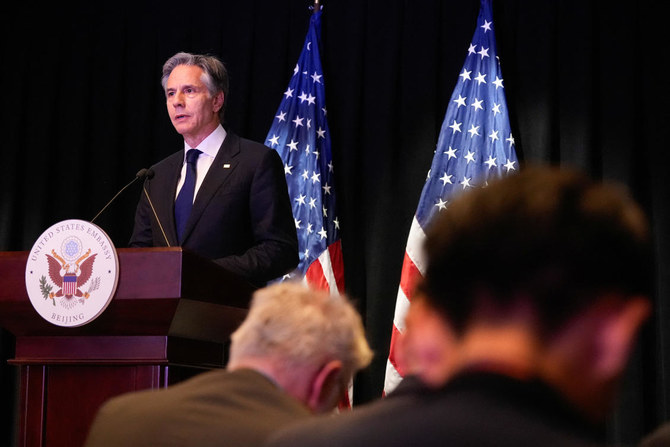
- US Secretary State Antony Blinken has stressed the ‘critical importance’ of maintaining peace and stability across Taiwan Strait while in China
TAIPEI: Taiwan reported renewed Chinese military activity near the island on Saturday with 12 aircraft crossing the sensitive median line of the Taiwan Strait, a day after US Secretary State Antony Blinken ended a visit to China.
The United States is Taiwan’s most important international supporter and arms supplier despite the absence of formal diplomatic ties. Blinken said he had stressed the “critical importance” of maintaining peace and stability across the strait while in China.
Democratically governed Taiwan has faced increased military pressure from China, which views the island as its own territory. Taiwan’s government rejects those claims.
Taiwan’s defense ministry said that from 9:30 a.m. (0130 GMT) on Saturday it had detected 22 Chinese military aircraft, including Su-30 fighters, of which 12 had crossed the median line to Taiwan’s north and center.
The line once served as an unofficial border between the two sides over which neither sides’ military crossed, but China’s air force now regularly sends aircraft over it. China says it does not recognize the line’s existence.
Taiwan’s defense ministry said the aircraft were involved in “joint combat readiness patrols” with Chinese warships, adding that Taiwanese aircraft and ships responded “appropriately.” It did not give details.
China’s defense ministry did not answer calls seeking comment outside of office hours on Saturday.
Taiwan’s armed forces are well-equipped and well-trained but dwarfed by those of China’s, especially the navy and air force, which respond almost daily to Chinese missions.
China considers Taiwan the most important issue in its relations with the United States, and Beijing has repeatedly demanded Washington end weapons sales to Taiwan.
Taiwan President-elect Lai Ching-te takes office on May 20 after winning January’s election. Beijing considers him a dangerous separatist and has rebuffed his repeated calls for talks.
Lai said on Thursday that China should have the confidence to talk to Taiwan’s legally elected government. Like outgoing President Tsai Ing-wen, Lai says only Taiwan’s people can decide their future.


